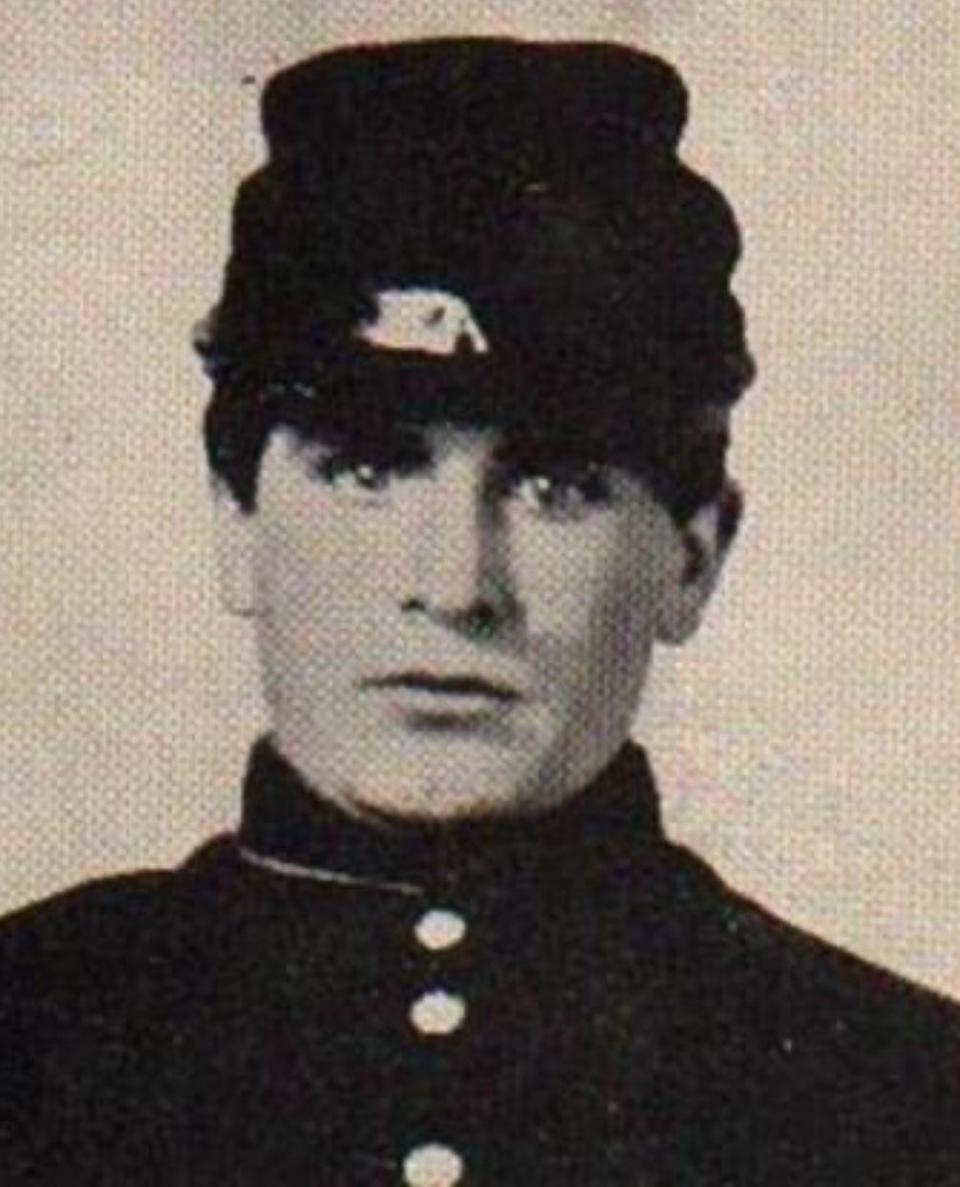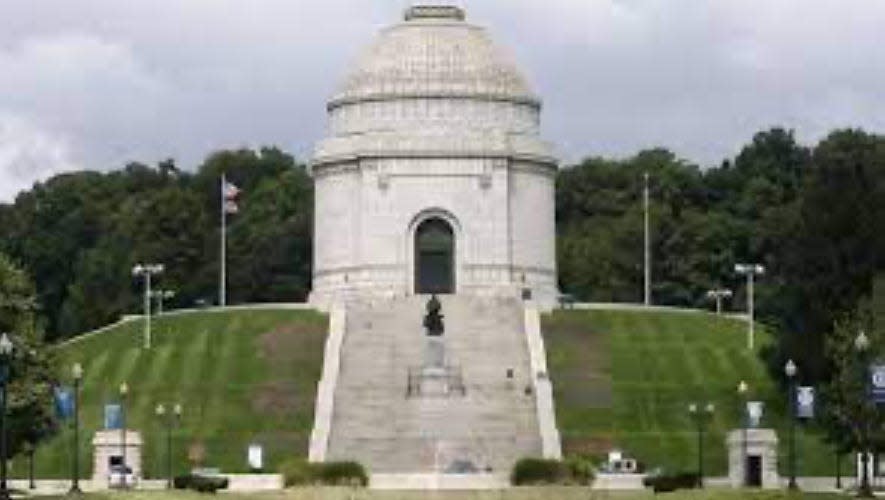President William McKinley helped thrust Canton onto the national stage

- Oops!Something went wrong.Please try again later.
- Oops!Something went wrong.Please try again later.
- Oops!Something went wrong.Please try again later.
- Oops!Something went wrong.Please try again later.
Few communities in the country are known as the home of a U.S. president.
Canton is among them. Today is the birthday of that man, President William McKinley Jr., who was in office from 1897 to 1901.
"There are only 45 people who have been elected president (Grover Cleveland served two non-consecutive terms), which places Canton in a very elite group of cities that can claim they were home to a president," said Kimberly Kenney, executive director of McKinley Presidential Library & Museum. "In our case, William McKinley's decision to run a front porch campaign from his home on Market Avenue meant that Canton was thrust onto the national stage in a way that most presidential communities cannot claim."
The McKinley National Memorial, the towering tomb of President McKinley that is a short walk up a hill from McKinley Presidential Library, provides somber evidence the city can lay claim to a chief executive who not only served his country, but also lost his life for it.
When Canton went to the White House: A look back at Canton's William McKinley becoming president 125 years ago
"As one of four assassinated presidents, McKinley is also part of an even more exclusive club. Canton became the epicenter of a nation's mourning when he was laid to rest in the Werts Receiving Vault in West Lawn Cemetery on Sept. 19, 1901," Kenney noted. "Canton was again in the national spotlight on Sept. 30, 1907, when President Theodore Roosevelt attended the dedication ceremony of the McKinley National Memorial."
The website for the National Park Service distinguishes between McKinley National Memorial and a second monument in the city of McKinley's birth.
"This large circular, domed mausoleum is the final resting place of William McKinley, the 25th president of the United States," notes the website. "McKinley was born in Niles, Ohio, but he called Canton home throughout his adult life. He began his career in this city, met his beloved wife, and ran for the highest office of the nation here."
Ohio is familiar with presidents. The state has ties to eight U.S. presidents. Seven were born in Ohio: Ulysses S. Grant of Point Pleasant, Rutherford B. Hayes of Delaware, James A. Garfield of Orange Township (now Moreland Hills), Benjamin Harrison of North Bend, McKinley of Niles, William H. Taft of Cincinnati and Warren G. Harding of Corsica (now Blooming Grove). William Henry Harrison was born in Virginia, but settled in Ohio, so the state's claim to him is strong.
McKinley came to Canton early enough in his life to have the city be considered his hometown. He maintained a residential presence while the young lawyer was litigating and later building a political career.
A confluence of events was needed to bring him to and keep him in the Canton area.
On this, the 181st anniversary of the Jan. 29, 1843, birth of McKinley, it seems appropriate to review moments in history that – if altered – could have afforded some other community the recognition of being the home of President McKinley.
Not all was easy for No. 25: Congratulations President McKinley ... meet your problems
Boyhood and early life
The McKinley family moved to Ohio when William McKinley's father, William McKinley Sr., was just a boy. The elder McKinley had been born in Mercer County, Pennsylvania, to the family of Irish immigrant David McKinley.
If not for that move of his family, William McKinley Jr. might have been the third Pennsylvania president instead of the sixth of eight Ohioans elected as the nation's chief executive.
After the family’s 1852 move to Poland, Ohio, McKinley attended Poland Seminary, graduating in 1859, before enrolling for a year at Allegheny College in Meadville, Pennsylvania. He also studied at Mount Union College in Alliance.
History records the future president worked as a postal clerk and a schoolteacher in Poland, careers that might have diverted McKinley's path to the presidency.
McKinley also was among the men who enlisted when the Civil War started in 1861.
"In June 1861, he left his teaching position and enlisted in the Union Army as a private in the newly formed 23d Ohio Volunteer Infantry Regiment, also known as the 'Poland Guards' (referring to Poland, Ohio)," notes the website for the National Museum for the U.S. Army.
"McKinley distinguished himself as a capable soldier at the early Civil War battles of Carnifex Ferry and Fayetteville in what is now West Virginia. In 1862, he fought in the bloody Battle of Antietam and proved his bravery by bringing much-needed supplies and rations to frontline soldiers under heavy fire. For this action, McKinley was promoted to second lieutenant."
History put a nickname on William McKinley, who ended the war as a brevet major, for his gallant actions on the battlefield.
"During the battle he drove a wagon full of supplies, including coffee, to the front line," explains a posting at the website visitcanton.com. "Later, during his political career, his opponents referred to him as 'Coffee Bill.'"
But, if he had not survived the heavy fire that came upon him at Antietam, a battle that killed more than 3,500 Union and Confederate soldiers, McKinley would never have lived to run for office.

Meeting Ida Saxton
According to a local presidential historian, the late Richard McElroy, after the war McKinley intended to stay in the army.
"He told his father this and the response was, 'Well, William, you can do as you please, but I have never thought that soldiers amounted to much in times of peace,'" McElroy once wrote. "He decided to attend Albany Law School instead."
According to the website for the McKinley Memorial Library in Niles, "He then moved to Canton, Ohio, where two of his sisters were schoolteachers, and acquired a job working for Judge George Belden."
Later, McKinley opened his own law office in Canton.
"While doing business at a local bank he met Ida Saxton, the daughter of a local banker and also known as the 'Belle' of Canton," the library website documents. "They married in January 1871 and their first daughter, Katherine, was born on Christmas day of that year. Their second child, Ida, born in 1873, died at the age of 4½ months. That same year, Mrs. McKinley’s mother also died. Two years later, their first daughter, Katie, died of typhoid fever."
His local law career, loving marriage and the deaths of family members close to him strengthened McKinley's ties to Canton. Without them, McKinley might have used the city as a stopping point in a noted life lived elsewhere.

Illustrious political career
Mentored following the war by Rutherford B. Hayes, who himself was elected as the country’s 19th president, it is unsurprising McKinley parlayed his law practice and his Republican Party connections with his city and state personal acquaintances to forge a political career that began with election as Stark County prosecuting attorney.
McKinley's election as a member of the U.S. House of Representatives and governor of Ohio built upon his prominence, and it is unlikely that without those offices McKinley would have gathered enough recognition to make a run for the highest office in the land.
Still, his pair of successful "Front Porch" campaigns – in 1896 and 1900 – didn't assure Canton the prestige of being a home of a president. Only the fateful decision of assassin Leon Czolgosz in 1901 at Buffalo, New York, solidified that lasting recognition.
Without McKinley's assassination, he might have been as overlooked in history as many of the late 19th century presidents.
Instead, following his death, a monument was built for him and a presidential library was named after him in Canton. Scholars and historians who journey to Canton qualify the city as the home of a president. Tourists quantify that reputation.
"Visit Canton has estimated that tourism in Stark County generates $1 billion, but that doesn't single us out," Kenney noted. "I can say that our revenue from admissions and membership in 2023 was more than $440,000."
Reach Gary at gary.brown.rep@gmail.com. On Twitter: @gbrownREP.
This article originally appeared on The Alliance Review: President William McKinley and Canton are tied together

